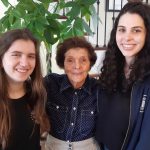Helena Hirschl (nee Beinhacker) was born in Bratislava, Czechoslovakia in 1928. An only child, she grew up in a well-to-do assimilated family, and her father was in the construction business. Helena remembers the prewar period in largely positive terms. She was unaware of the hatred bubbling beneath the surface; she had friends and liked school, and her parents sheltered her. As the restrictions against Jews mounted in the early part of the war, Helena managed to get into her local gymnasium, one of only three Jews allowed to do so in her community. As the war intensified, the family was separated, with her father sent to a labour camp. Helena and her mother were eventually deported to Auschwitz-Birkenau, where her mother was executed when she attempted to stay with her young daughter. A teenage girl, Helena was selected by the infamous Dr. Mengele, who at that time looking for young women for the soldiers’ brothels. Helena was sent to what she was told was an agricultural camp near the Baltic, but as she recalls in fragments she was violated by the soldiers. She recalls as well at this time that she was forced by the Germans to be a slave labourer, pushing carts with human remains as the Nazis attempted to cover up the enormity of their crimes. The Russian Red Army drew closer all the while, and eventually Helena was liberated. In the chaotic aftermath she made her way back to Czechoslovakia, but she remembers life there held no promise, so through a family connection she made her way to South America, first to Uruguay and later to Caracas, where she met her husband and started her family. Venezuela would face its own turmoil at a much later time, and in that period of time she made her way to Canada, where she lives today with family.
Helena Hirschl was interviewed for this project in her home in June 2019, by Arielle Meyer, Georgia Gardner, and Scott Masters.
Videos
Click next video below to keep watching
